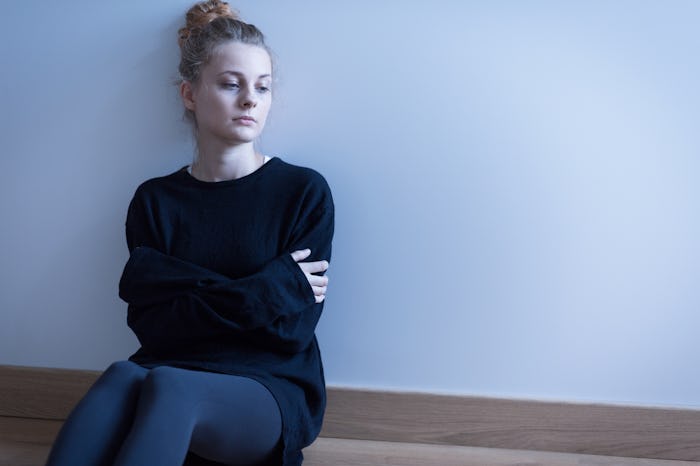Life

6 Signs Your PPA Is Dangerous
Postpartum anxiety, or PPA, is a struggle that's comparable to postpartum depression (PPD) but isn't as well known. Most women think that when they aren't experiencing symptoms of sadness or suicidal thoughts in correlation with anxiety that it isn't an issue. But just because symptoms don't fit classic PPD, doesn't mean they should be ignored. The signs your PPA is actually dangerous exist, but because they don't present themselves in the form of depression, many moms feel the need to brush it off — and they shouldn't
Being a little more worried or cautious postpartum isn't out of the norm. I mean, you now have someone's entire life in your hands. So if worry sets in, you may begin to wonder what defines PPA and how to differentiate it. When you find that worry and fear are dictating every move, you should pay attention, especially if worry is driving you to the point of exhaustion by causing sleepless nights or keeping you in constant fear.
According to HuffPost, PPA may be even more common than PPD. It can cause women to have constant, sometimes paralyzing feelings of worry and make it hard to eat or sleep. It often remains undiagnosed because symptoms are written off by moms as a response to a new baby. In an interview with Parents magazine, psychologist Jonathan Abramowitz said postpartum anxiety is a hidden disorder because it is so often unrecognized by moms. He shared that it hasn't been discussed or studied enough, even though it's more common than PPD.
So if you find yourself in a constant state of worry, acting totally out of character, or always harboring fear, read through some of the signs below that may indicate your PPA is more serious than you think.
1You're Not Bonding With Your Baby
Postpartum Progress noted that moms who struggle with PPA in the first few weeks, months, and even years of motherhood can struggle with forming healthy attachments. Many times feelings of guilt – like you're not good enough as a mom or should be handling yourself better – can interfere with creating a bond. You may feel the need to overcompensate and end up making more frustration and anxiety for yourself. Postpartum Progress stressed that healthy attachment doesn't mean being with your baby all the time, and that mistakes are also a key part of the bonding process as well.
2You're Unable To Sleep
According to the aforementioned HuffPost article, PPA can make it difficult for women to sleep. If you're up late at night going through concern after concern in your mind, it will take a toll on your already tiring lifestyle. Anxiety can take over making you constantly alert or that something is immediately wrong, with yourself or your baby.
3Your Worry Is Affecting Your Relationships
PPA can take over your life in a severe way that also affects your partner or other prominent relationships. According to Good Therapy, if anxiety takes over, it can cause you to lose focus on important aspects of your life that need attention. You may notice as your anxiety gets stronger, your relationships get weaker, and that's a sign to reach out to a therapist or doctor for advice.
4You're Unable To Perform Normal Tasks
PPA makes it difficult to function normally. If performing everyday tasks like going for a walk or dropping your baby at the sitter's is overwhelmingly difficult, PPA can begin to truly affect the quality of your life. According to Parents' aforementioned article, you shouldn't feel panicked every time you're doing simple, daily tasks, with or without your child.
5You Refuse To Leave The House
Speaking as a mom who experienced anxiety for the very first time after my second pregnancy, this was the thing that finally made me say, "hey, this is seriously affecting how I live now." When I noticed I was starting to turn down invites or cancel plans because of the anticipation of anxiety or the anxiety itself, I wasn't me anymore. If you're making excuses to stay home instead of doing the things you normally do, start finding ways to alleviate anxiety or reach out to someone.
6You Feel Like You Have No Control
It can be an anxious feeling in and of itself to realize you have no control over when panic or hyper-alterness will set in. If you're still asking yourself if you're experiencing a normal amount of worry, think about whether or not you have control over it. According to AnxietyBC, if constant worry is out of your control and seems irrational (to yourself or others), it's a good idea to reach out to a professional to work on gaining back control.